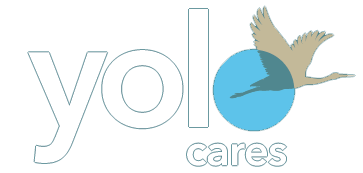A Chance to Strengthen
Yolo’s Safety Net
by Craig Dresang, CEO
December 19, 2021

Earlier this year, when it was announced that the City of Davis would receive nearly $20 million and Yolo County would collect $43 million from the federal stimulus initiative called The American Rescue Plan, YoloCares submitted a funding request to address the housing and healthcare needs of those who are terminally ill and homeless.
The agency’s $3.5 million request to fund the construction of a special hospice residence would address three of Yolo County’s stated goals for mitigating homelessness in our communities. It would also support hospital partners by reducing the cost of re-admissions and providing an appropriate, high-quality step-down program for their patients experiencing homelessness. This, in turn, would increase hospital bed capacity in Yolo County by offering an alternative for homeless patients whose care needs can be addressed by hospice or palliative care.
As city and county officials, along with their assigned workgroups, inch closer to final decisions about American Rescue Plan funding allocations in Yolo County, the YoloCares Board of Directors is stressing the impact that the agency has already had on Yolo County residents facing homelessness.
When people think of a hospice, they often imagine a safe, comfortable bed and proper care in one’s final hours. While YoloCares does provide the highest quality care to all patients at the end of their lives, that is only one moment in a broad and comprehensive continuum of care that begins much earlier.
Unlike many hospices and healthcare systems, YoloCares has never turned away a patient because of inability to pay, lack of insurance, or the complexity of their diagnosis. The agency routinely brings its considerable team together to support the most complex and/or difficult cases. In fact, YoloCares often receives the county’s most challenging cases after patients fail to secure help elsewhere. One of those cases recently involved a man we call Frank.
Frank has been homeless off and on for years, sometimes living in Section 8 housing, sometimes living on the street, in cars, or whatever location he could find. Though in recovery from past chronic substance abuse, he has been unable to find and maintain adequate housing. As if homelessness weren’t enough to manage, Frank also has multiple serious medical conditions, including diabetes, congestive heart failure, and possible cancer.
Without a home base to work from, managing medical appointments, medications, transportation, referrals, etc., was overwhelming for Frank. He didn’t have anyone to help him, and his history made him distrust health systems.
Supportive care services were exactly what Frank needed to get a hold of his medical conditions and feel stronger. A YoloCares nurse navigator helped him sort through multiple referrals, accompanied him to and from appointments, advocated for him, formulated questions for his doctors, and nailed down goals of care to work toward. The team taught him how to prioritize and schedule his care and worked with his multiple providers to coordinate medications and care planning. Together, they made Frank’s wishes about his care clear.
Now, in a far more stable place medically and back in Section 8 housing, Frank uses his time making handcrafted toy cars for Shriner’s Children’s Hospital. He builds 100 cars at a time and delivers them to children facing serious illness.
Much like Frank, another patient named Andrew was living out of his car when he was diagnosed with multiple myeloma, a very serious form of cancer. He had been left homeless when his family moved out of state, and now faced intensive medical needs while having no coordination of care or safe harbor from which to work towards medical stabilization.
YoloCares helped Andrew get Section 8 housing and began to support him through care navigation, accompanying him on specialist visits to help sort through his diagnosis and treatment options, managing his medication coordination and acting as a liaison and advocate with multiple providers. He now has more stability from which to make plans for the remainder of his life.
A third recent case that illustrates how YoloCares serves as a crucial safety net involves a man named Tom. When the YoloCares team found Tom, he was at another person’s apartment where he was couch surfing. He was lying in filthy pajamas, covered in feces and urine. He was near death with terminal cancer, unable to get up and care for himself, and the person whose apartment he was staying in also struggled with severe illness and could not help. The YoloCares team worked quickly to clean Tom up and to find a bed for him in a skilled nursing facility.
But skilled nursing beds were hard to find, and time was running out for Tom. While coordinating with area facilities to find a place for Tom, his care team also learned that he had been estranged from his sister — his one living family member — and he was deeply troubled by that.
While half the team worked with skilled nursing staff to move partitions, beds, equipment, and furniture just to get Tom admitted to a facility, the rest of the team began the detective work of locating and speaking to Tom’s sister. She was receptive, so the team coordinated and assisted Tom on a Zoom call with her as soon as he was settled into his new bed. He was relieved and deeply touched to have made peace with his sister. After their conversation he was visibly relaxed. Tom shed years of stress once he was clean, comfortable and cared for in a warm bed with proper medical attention. He passed within two days, after finally being able to feel safe enough to let go.
YoloCares treats the seriously ill wherever they are: their home, their car, a shelter, a riverfront campsite, or under a bridge. It is utterly heartbreaking to see how much harder it is for unhoused patients to get the rest and recovery they need. With facility beds being in short supply, it can be nearly impossible for those patients to access safe housing without a care team to advocate on their behalf.
The proposed hospice residence that would be built with ARP funding could help those like Frank, Andrew and Tom by providing a short- or long-term respite in a care center. They would be safe, comfortable, and fully supported. They would have the best possible chance of recovering, when possible, or finding peace at the end of their lives.





Leave a Reply